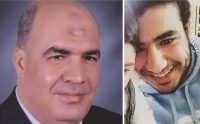Home » Egypt » Press Releases » EGY - News » Egypt: Enforced Disappearances of a Father and Son - International Community Must End Complicit Silence on Gross Human Rights Violations
On the night of 23 April 2015, at around 1:30am and without prior warning, several members of the police and security forces broke into the Fiki family flat in Qotour, 100km north of Cairo, and, without showing any arrest warrant, arrested Salah and Osama and searched the house without giving any reason. They took some money, phones and computers before forcibly dragging the two men outside without decent clothing. In front of their neighbours who were too scared to protest the arrest, they forced them into a car and took them to an unknown location.
Despite the numerous steps taken to locate them – including sending several communications to the Attorney General, the Ministry of Interior and the General Prosecutor in Tanta – their family have not heard from them since the day of their arrest. In fact, to date, all of their communications to the authorities have remained unanswered. They even met with George Ishaq, a member of the National Council for Human Rights (NCHR) – the Egyptian National Human Rights Institution (NHRI), a semi-governmental body that has for mission, amongst others, to "examine complaints concerning the protection of human rights, refer any such complaints to the competent bodies and follow-up with them, advise the parties concerned on legal procedures and assist them in such regard [...]," as enshrined in Article 3(4) of Law 94 of 2003 promulgating its establishment – to ask him to intervene on their behalf, but to no avail; the meeting only highlighted the NCHR's lack of power and independence from the executive branch, to the detriment of the citizens.
Nearly two months after their enforced disappearances, their relatives continue to ask their whereabouts at the State Security Court and in various police stations of Kafr El Sheikh despite regular threats by the security forces. They are particularly worried that Salah and Osama are being tortured during their secret detention, as it is highly likely that the two men were abducted because of Salah's affiliation to the Muslim Brotherhood, of which he managed the bureau in Kafr El Sheikh prior to the regime's listing of this political movement as a terrorist group in December 2013.
"Since the beginning of 2015, and as we had already started to witness it in 2014, hundreds of individuals have been abducted in Egypt and most have not reappeared since," said Rachid Mesli, Alkarama's Legal Director. "We are afraid that this practice is progressively becoming common place, systematic and generalised, which would characterise a crime against humanity. It is high time for the international community to end its complicit silence regarding the situation of human rights in Egypt."
In the absence of response from the authorities, Salah and Osama's family turned to Alkarama who sent an urgent appeal to the WGEID to call upon the Egyptian authorities to release Salah and his young son Osama immediately or, at the very least, that they disclose their places of detention and authorise their families to visit them. Alkarama also urged the WGEID to request a country visit to Egypt to assess the level of compliance of the authorities with their international obligations and to take effective measures to put an end to the practice of enforced disappearances.
For more information or an interview, please contact the media team at This email address is being protected from spambots. You need JavaScript enabled to view it. (Dir: +41 22 734 10 08)
 Algeria
Algeria Bahrain
Bahrain Djibouti
Djibouti Egypt
Egypt Iraq
Iraq Palestine/Israel
Palestine/Israel Jordan
Jordan Kuwait
Kuwait Lebanon
Lebanon Libya
Libya Mauritania
Mauritania Morocco
Morocco Oman
Oman Qatar
Qatar Saudi Arabia
Saudi Arabia Sudan
Sudan Syria
Syria Tunisia
Tunisia United Arab Emirates
United Arab Emirates Yemen
Yemen Other Countries
Other Countries







